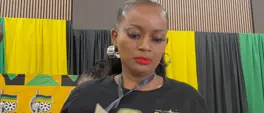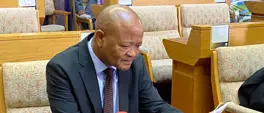DR LULU GWAGWA | How the absence of safe spaces for Black women forges injustice
Dr Lulu Gwagwa
12 August 2025 | 12:59'South African women experience mental health problems more acutely than men due to a complex interplay of factors including high rates of violence and abuse, socio-economic challenges, and the disproportionate burden of caregiving responsibilities.'

Depression psychology sad emotions. Picture: pixabay.com
On the 3rd of August 2018, a young law student at Rhodes University took her own life.
Khensani Maseko, who was just 23 years old, had endured sexual violence at the hands of a fellow student. Her decision to take her own life came just days after she had reported the incident, which had occurred three months prior, to the authorities at the university.
Unable to bear the pain, she travelled home to Johannesburg with her family to seek mental health support. On that cold August morning, she wrote on her Instagram page: “No one deserves to be raped!”, and just hours later, she would end her young life. Following her death, protests ignited across various South African universities, with students demanding greater investment in mental health support services.
Earlier this year, on the 8th of January, Dr. Antoinette Candia-Bailey, who was serving as the Vice President for Student Affairs at Lincoln University in the state of Missouri in the United States, tragically took her own life after being subjected to bullying by the university’s leadership.
Like Khensani, Dr. Candia-Bailey had reported the struggles that she was battling with weeks prior, and just days before she ended her life, she had sent an email out to several people detailing her deteriorating mental health due to the toxic work environment she was forced to navigate.
As with the case of Khensani, Dr. Candia-Bailey’s untimely death resulted in protests and a national discussion on the treatment of Black women in academia.
These two cases may have occurred in two different geographical contexts, at different times, and for different reasons.
But there is a common denominator between them that cannot be ignored – two Black women, having endured traumatic events and feeling unsupported, opted to take their own lives.
Both women were gifted, with Khensani having served in the Students' Representative Council of Rhodes University and Dr. Candia-Bailey having achieved significant feats in her journey as an academic administrator, including becoming the first Vice President of student affairs and Chief Diversity Officer at the highly respected Elms College in Massachusetts.
Their deaths, and those of many other Black women, compel us to think critically about the state of mental health among Black women, and just as importantly, the progress that has been made in the provision of mental health resources for them.
Seven years since the devastating loss of Khensani, South Africa is still grappling with the growing rates of mental illness and suicide among young women. Research indicates that a substantial percentage of young women in South Africa experience mental health issues.
A 2021 study by Mthiyane and various other scholars found a 22.2% point prevalence of probable common mental disorders among rural adolescent girls and young women. This aligns with studies, including a 2024 report by the National Planning Commission, which indicates that in South Africa, mental health challenges are a significant concern among young women in particular.
The studies indicate high prevalence rates of common mental disorders like depression and anxiety, and an increased risk for those experiencing trauma, HIV, or facing socio-economic hardship.
South African women experience mental health problems more acutely than men due to a complex interplay of factors, including high rates of violence and abuse, socio-economic challenges, and the disproportionate burden of caregiving responsibilities.
These factors create what researchers refer to as “a perfect storm of stressors” that can negatively impact mental well-being. What has also emerged from mental health literature in South Africa is that common mental illnesses such as anxiety and depression are seen beyond the racial and class divide, even as Black women are most affected.
Professor Simone Honikman from the University of Cape Town and the founder of the Perinatal Mental Health Project (PMHP) explaining it in the context of perinatal women, contends that the core social determinants of mental unwellness in our country include poverty, food insecurity, intimate partner violence, domestic violence, discrimination, social isolation and marginalisation, experiences of adverse childhood events and trauma, and a lack of safety and security.
These social determinants extend beyond perinatal women, and more significantly, are both gendered and racialised. Their impact on women in the domestic and workspaces is significant.
Black women, confronted with experiences of trauma, discrimination, economic violence and social isolation, are especially affected by mental health challenges. The data is unambiguous on this.
The implication is that women in South Africa, particularly Black women, are in need of not just mental health support but also safe spaces in which they can exist as fully human. The creation of such spaces is critical if we are to arrest the growing crisis of Black women’s mental health challenges in both the productive and the reproductive space.
It is especially important that Black women are provided the necessary support to facilitate their empowerment because it is only when Black women are supported and empowered that we can begin to forge communities that thrive. Such communities must be built on material and non-material support, anchored on psychological safety.
In the second part of this conversation, we will explore the meaning of psychological safety and locate it within the context of the support required to achieve women’s empowerment.
We will answer the question: “What are safe spaces for Black women and how can these be created in South Africa?” Defining safe spaces and engaging in a process of co-creation of these spaces is a necessary step towards protecting and supporting young Black women.
The death of Khensani and so many others like her, who felt unsupported, in Africa and beyond, should be a reminder of the kind of society we do not want.
Lulu is an accomplished development planner, business leader, philanthropist and founder of Traversing Liminality.
Get the whole picture 💡
Take a look at the topic timeline for all related articles.















